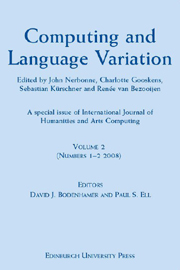Book contents
- Frontmatter
- Contents
- From the Editors
- Notes on Contributors
- 1 Introduction: Language Variation Studies and Computational Humanities
- 2 Panel Discussion on Computing and the Humanities
- 3 Making Sense of Strange Sounds: (Mutual) Intelligibility of Related Language Varieties. A Review
- 4 Phonetic and Lexical Predictors of Intelligibility
- 5 Linguistic Determinants of the Intelligibility of Swedish Words among Danes
- 6 Mutual Intelligibility of Standard and Regional Dutch Language Varieties
- 7 The Dutch-German Border: Relating Linguistic, Geographic and Social Distances
- 8 The Space of Tuscan Dialectal Variation: A Correlation Study
- 9 Recognising Groups among Dialects
- 10 Comparison of Component Models in Analysing the Distribution of Dialectal Features
- 11 Factor Analysis of Vowel Pronunciation in Swedish Dialects
- 12 Representing Tone in Levenshtein Distance
- 13 The Role of Concept Characteristics in Lexical Dialectometry
- 14 What Role does Dialect Knowledge Play in the Perception of Linguistic Distances?
- 15 Quantifying Dialect Similarity by Comparison of the Lexical Distribution of Phonemes
- 16 Corpus-based Dialectometry: Aggregate Morphosyntactic Variability in British English Dialects
2 - Panel Discussion on Computing and the Humanities
Published online by Cambridge University Press: 12 September 2012
- Frontmatter
- Contents
- From the Editors
- Notes on Contributors
- 1 Introduction: Language Variation Studies and Computational Humanities
- 2 Panel Discussion on Computing and the Humanities
- 3 Making Sense of Strange Sounds: (Mutual) Intelligibility of Related Language Varieties. A Review
- 4 Phonetic and Lexical Predictors of Intelligibility
- 5 Linguistic Determinants of the Intelligibility of Swedish Words among Danes
- 6 Mutual Intelligibility of Standard and Regional Dutch Language Varieties
- 7 The Dutch-German Border: Relating Linguistic, Geographic and Social Distances
- 8 The Space of Tuscan Dialectal Variation: A Correlation Study
- 9 Recognising Groups among Dialects
- 10 Comparison of Component Models in Analysing the Distribution of Dialectal Features
- 11 Factor Analysis of Vowel Pronunciation in Swedish Dialects
- 12 Representing Tone in Levenshtein Distance
- 13 The Role of Concept Characteristics in Lexical Dialectometry
- 14 What Role does Dialect Knowledge Play in the Perception of Linguistic Distances?
- 15 Quantifying Dialect Similarity by Comparison of the Lexical Distribution of Phonemes
- 16 Corpus-based Dialectometry: Aggregate Morphosyntactic Variability in British English Dialects
Summary
This is the report of a panel discussion held in connection with the special session on computational methods in dialectology at Methods XIII: Methods in Dialectology on 5 August, 2008 at the University of Leeds. We scheduled this panel discussion in order to reflect on what the introduction of computational methods has meant to our subfield of linguistics, dialectology (in alternative divisions of linguistic subfields also known as variationist linguistics), and whether the dialectologists' experience is typical of such introductions in other humanities studies. Let's emphasise that we approach the question as working scientists and scholars in the humanities rather than as methodology experts or as historians or philosophers of science, i.e. we wished to reflect on how the introduction of computational methods has gone in our own field in order to conduct our own future research more effectively, or alternatively, to suggest to colleagues in neighbouring disciplines which aspects of computational studies have been successful, which have not been, and which might have been introduced more effectively. Since we explicitly wished to reflect not only on how things have gone in dialectology, but also to compare our experiences to others, we invited panellists with broad experience in linguistics and other fields.
We introduce the chair and panellists briefly.
John Nerbonne chaired the panel discussion. He works on dialectology, but also on grammar, and on applications such as language learning and information extraction and information access. He works in Groningen, and is past president of the Association for Computational Linguistics (2002).
- Type
- Chapter
- Information
- Computing and Language VariationInternational Journal of Humanities and Arts Computing Volume 2, pp. 19 - 38Publisher: Edinburgh University PressPrint publication year: 2009



